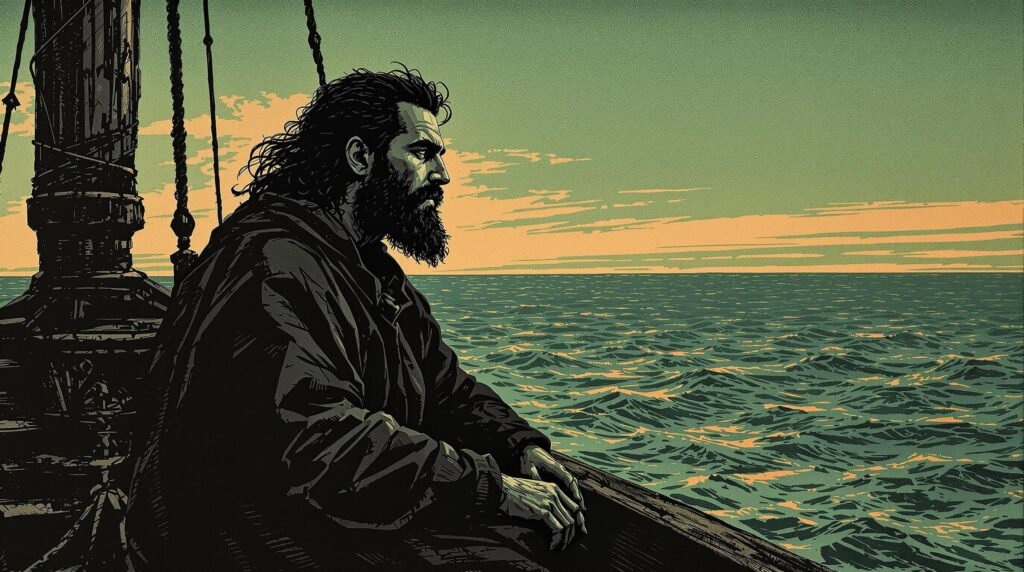In this chapter, Zarathustra is on a solitary journey across the sea, distancing himself from the “blessed isles” and his friends. Four days into his voyage, he has overcome his initial sorrow and stands resolute in his fate. He converses with his joyful conscience, expressing a desire for solitude under a pure sky and above a free sea.
Zarathustra reflects on the two previous occasions when he found his friends, noting that these both occurred in the quietude of the afternoon—a time when all light becomes calmer. He observes that happiness seeks out bright souls to dwell in. He recalls how his own happiness once descended to find shelter and discovered hospitable souls—his friends—who became companions in his journey.

With such riddles and bitterness in his heart, Zarathustra sailed over the sea. When, however, he was four days’ journey from the blessed isles and from his friends, had he overcome all his pain: triumphant and with firm feet, he again stood before his fate.
Central to the chapter is Zarathustra’s “children”, representing his creations. He acknowledges that the creator seeks companions and the progeny of his hopes but realizes that he himself must create such companions. Thus, he is immersed in his work, oscillating between his creations, aiming to perfect himself for their sake. He loves his children profoundly, viewing them as a verdant planting of his thoughts and the morning light of his highest hopes.
These “children”, still in their early stages, stand together like trees in the first spring, shaken by common winds in his garden’s fertile soil. Zarathustra intends to separate them, placing each alone to learn solitude, defiance, and caution. He envisions them becoming rugged and resilient, standing by the sea as living lighthouses of unconquerable life. Each must undergo trials and vigils to test and recognize whether they share his nature and lineage—masters of a long will, silent even when speaking, yielding in a way that they receive through giving.
For his creations to reach fuller completion, Zarathustra perceives the necessity to perfect himself. He resolves to evade his own happiness and expose himself to misfortune as a means of his final testing. Signs urge him that it is time to undertake this journey: the wanderer’s shadow and the longest while and the stillest hour all talk to him saying: It is high time! The wind calls through his keyhole and opens the door for him to go. Even his love for his children becomes a chain of desire that he must overcome. He associates desire with loss of himself, and seeks a state where possession of his creations brings security without yearning.
As he broods under the sun of his love, doubts and shadows pass over him. Repressed pains from his past resurface, signaling that the moment for transformation is imminent. An abyss within stirs, and a profound thought bites him—a thought so deep that he fears confronting it fully. He aspires to find the strength to summon and face this thought without trembling, vowing to summon the lion’s courage to summon up the heaviest thought.
In the meantime, Zarathustra finds himself adrift on uncertain seas, flattered by chance yet seeing no end in sight. He remains vigilant for the onset of his ultimate struggle, which has not yet arrived. The deceptive beauty of the sea and life surrounds him, and he compares himself to a jealous lover who distrusts even the smiles of the beloved. He tenderly but firmly pushes away this blissful moment, feeling that it has come prematurely. He prefers to stand ready for his deepest pain, believing that enduring and overcoming it is essential for his self-perfection.
Zarathustra bids the blessed hour to depart and bestow his happiness upon his children instead. As evening approaches and the sun sets, he feels his happiness fading. Throughout the night, he awaits misfortune, but it eludes him. The night remains serene and luminous, and instead, happiness draws ever closer. At dawn, he laughs heartily, realizing that happiness pursues him precisely because he does not chase after it, likening happiness to a woman.
